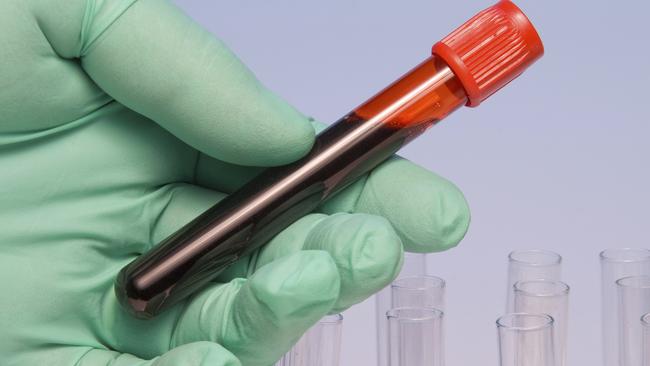New blood test predicts cancer recurrence
More than 100,000 colon cancer patients can avoid unnecessary chemo every year and the test will be available in just a few months.

Victoria
Don't miss out on the headlines from Victoria. Followed categories will be added to My News.
Melbourne researchers have developed a game changing blood test that can identify colon cancer patients at risk of relapsing, potentially saving more than 100,000 people from unnecessary chemotherapy every year.
One in five stage II colon cancer patients will relapse, but up until now there has been no way to identify who is at risk.
This means all patients are offered chemotherapy post-surgery, despite the majority never needing it.
The blood test, more than 10 years in the making, is expected to be available in Australia by October this year.
It is hoped the test — developed by the Walter and Eliza Hall Institute (WEHI) in Victoria and America’s Johns Hopkins Kimmel Cancer Centre – can identify risk in other cancers, including breast, bowel and lung.
WEHI Associate Professor and study co-author Peter Gibbs said he believes the findings “bring us closer to significantly improving treatment options for many patients across a broad range of cancer types”.

“(It’s the) first randomised trial in any solid tumour type worldwide that used a blood test to determine which patients can safely forgo chemotherapy after surgery,” he said.
“For all, what we call common solid cancers, the same rule should apply.
“Those studies are ongoing … but it could change the whole way we think about giving chemotherapy for cancer.”
The landmark study was published in the New England Journal of Medicine after tracking 454 patients from more than 20 Australian hospitals.
The test involves analysing a patients’ removed tumour to identify mutations in the cancer genes, followed by a simple blood test to assess levels of circulating tumour DNA, which could develop into larger masses.
Professor Gibbs said people who test negative have a relapse risk below 10 per cent.
“Once we know where the mutation is in the cancer, we look for the same mutation in the blood,” he said.
“In the great majority, we can not give chemotherapy and we can be confident that that’s the right thing to do.”

Prof Gibbs said the blood test also means some older patients — who sometimes decide against the ‘just in case’ chemotherapy — test positive and begin treatment sooner.
“In that group we’ve been able to cure most of them, so it’s been very pleasing,” he said.
An estimated 600 Australians could avoid unnecessary chemotherapy every year.
Melbourne’s Hugh McDermott took part in the trial after he had surgery for stage II colon cancer in 2017, and has been cancer free for almost five years.
He avoided chemotherapy and said the negative blood test was the “best news I got after the diagnosis of the cancer itself”.
“It was an absolutely brilliant moment,” he said.
“It removes all the uncertainty and anxiety and concern (about) the bad effects of chemotherapy as well as the possibility the cancer will come back.”
He said he hopes the test can be “adopted as standard clinical practice as quickly as possible”.
More Coverage
Originally published as New blood test predicts cancer recurrence




